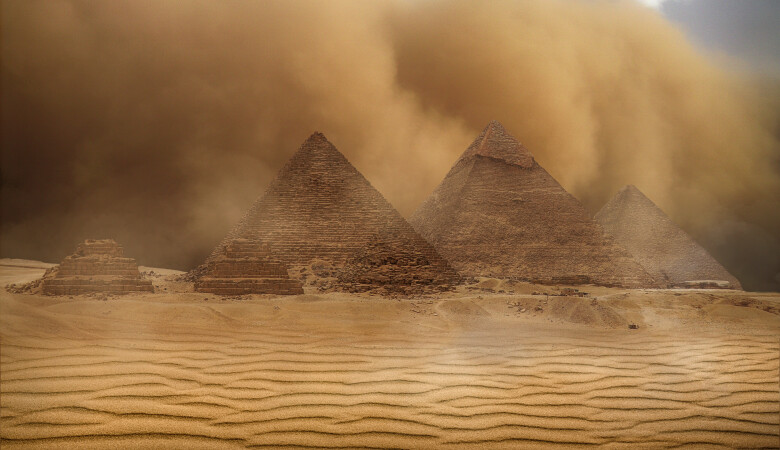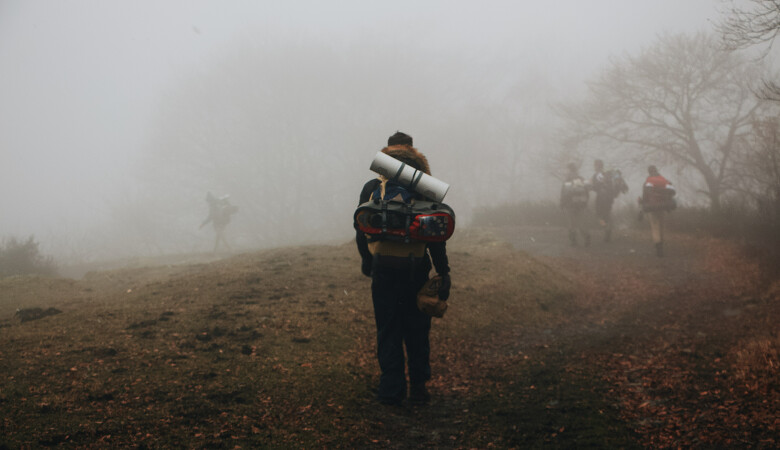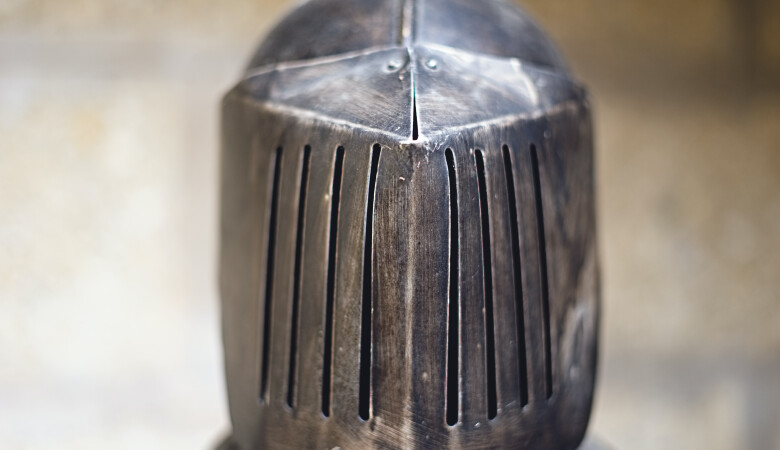Babylon: No Refuge for God's People (Isaiah Sermon 21 of 80)
October 05, 2008 | Andy Davis
Isaiah 21:1-17
Judgment, Prophecy
Pastor Andy Davis preaches a verse-by-verse expository sermon on Isaiah 21:1-17. The main subject of the sermon is how God's people require refuge and how He plans to provide it.
- SERMON TRANSCRIPT -
I. Introduction
So, we come to Isaiah 21. It’s been a fascinating week for us as we’ve looked at the ongoing struggle that our nation is having economically, which I mentioned last week. It’s fascinating to me to see people asking questions about refuge and shelter. They’re speaking financially, of course. They’re looking for a shelter for their money and for their worldly possessions, something that will last, something utterly secure, something bullet-proof. We already know, we can tell them on the authority of Jesus Christ, there is no such place. That’s why Jesus said, “Do not store up for yourselves treasures on earth, where moth and rust destroy, and thieves break in to steal. But store up for yourselves treasures in heaven, where moth and rust do not destroy, and thieves do not break in and steal. For where your treasure is, there your heart will be also.” (Mt 6:19-21)
We know that, don’t we? As Christians, we know that. Don’t put your trust, said the apostle Paul, in wealth, which is so uncertain. The Book of Proverbs says “Cast but a glance at riches, and they are gone, for they will surely sprout wings and fly off to the sky like an eagle.” (Prov 23:5) We’ve known that. Our treasure is in heaven, amen? It’s in Jesus Christ and the imputed righteousness of Christ. There’s no thief, there’s no natural disaster that can take that away. People have been using words like “refuge” and “shelter” recently. And I think it’s a fascinating thing. They look in the future and they see a storm coming. They’re looking for a place of refuge. I think about living in the Midwest, in the Plains region, where there are tornados that come and you have tornado watches. There will be a siren that will go off and you go to your safe haven, maybe a basement, or, like in the Wizard of Oz, it’s out across the farmyard. Remember how Dorothy had to make her way across and she barely made it down in the root cellar? Then she forgot Toto and had to go out and get him, and that was it. She was then whisked away by the tornado. But she was looking for shelter.
Or I think about in history, in World War II during the Blitz in London, when the Germans were bombing London night after night after night after night, an onslaught. At dusk, the siren would sound, warning of the coming of the bombers. The natives of London would flee. They would run down into the subterranean areas of the tube, as they called it, or down in the subway is what we would call it. They would spend the night there with total strangers, sometimes standing up all night, or sleeping side by side with somebody they had never met. They might drink tea together or sing songs. In this way, they had shelter from the bombing that was going on up above their heads. It’s a biblical concept as well. Think about the world as it was in the days of Noah, when there was a storm coming, a flood. For one hundred and twenty years, while the ark was being built, Noah preached that there was going to be a flood, that there was going to be a coming judgment, and that there would be a refuge, a safe place. If you entered that refuge, that ark that was growing ever larger, ever stronger, and ever clearer, right in front of their eyes, then he was preaching that they would flee from the wrath to come. But I can tell you from the scripture, from the gospel, there is no safe shelter from the true storm that is coming.
The true storm that is coming is not economic, my friends. It’s not financial. It’s not military through terrorism or any other way. It’s not natural disasters. “These things may come,” said Jesus, “but the end is still to come.” They’re just birth pains. The real judgment is before Almighty God, the one who has pure eyes, holy eyes, and can tolerate no evil at all. I had a witnessing opportunity with a man on a plane. Woe to the person who sits next to me on a plane. All right? Well, I hope it’s a blessing. I’m really hoping that it would be a blessing and not a woe. I don’t force anything on anybody, especially if they’re wearing headphones. You know, you see the big, thick Bose headphones, and it’s over. All right? The witnessing opportunity is done. But this was actually a great conversation, and I felt my primary responsibility was to make judgment day vivid to this man, to give him a vivid sense of the fact that someday he will stand before God and give an account. Is he ready? Does he have a shelter for that?
It was a discussion of economics that led us into that. You can get to the gospel from anywhere. What is the shelter where you can put your money and it’s going to be safe? The answer is nowhere. But where can you put your soul and it will be safe? The answer is Jesus Christ, amen? He is the refuge. He is the shelter. The problem is that human beings are always casting about for some other place. It says in the Book of Proverbs, “The name of the Lord is a strong tower; the righteous run to it and are safe.” (Prov 18:10) There’s your refuge. Jesus Christ. Call on the name of the Lord. Everyone who calls on the name of the Lord will be saved. You’ll stand under the refuge of the shed blood of Christ and you will be free from sin. The real danger is the wrath of God, the judgment of God. He has, by His grace, crafted a safe haven, a refuge called Jesus Christ, Amen?
II. Trusting in Babylon: A Devastating Mistake
A Message of Warning… and Comfort… to God’s People
We’re always casting about, looking for some other thing, making some other plan. The Jewish people back in Isaiah’s day were no different. So we’re in the middle of the oracles of the nations. This will be my last sermon on the oracles of the nations. When I get back from Haiti, I’ll preach one sermon on ministry to the poor, and then we’ll be going to the Gospel of Matthew. Some time in the future, if God wills, we’ll come back to the Book of Isaiah. But as we’ve looked at these oracles, one after the other, we have seen how God gives these words of judgment to the nations. He’s got a lot of things going on. One thing is He’s warning those nations of the coming judgment so they will flee to Him and be saved. But He’s also speaking these oracles to the Jewish people. Why? So that they will not trust in these nations instead of God. So that they’ll not flee to Babylon as though the Babylonians are going to save them. So it’s a message of warning and of comfort to God’s people, really.
Look at Isaiah 21:10. You can see the message to the Jews right in this warning, this oracle of woe against Babylon. Look at what he says in verse 10. “O my people, crushed on the threshing floor, I tell you what I have heard from the Lord Almighty, from the God of Israel.” He’s speaking to His people, His Chosen people. He’s giving them a word of warning and of comfort. God’s people are the point of history, from God’s perspective. However, God’s people are crushed by history from the human perspective. So today, Christians are like dust on the scales. Among the movers and shakers of human history, we don’t make much of an impact. But God has a message to His people, crushed by the wheels of the nations. That crushing, I think, refers to the twofold exile. The exile that’s about to take place in Isaiah’s day is by the Assyrians. They’re going to take the northern ten tribes, and they’re gone in 722 BC. But then one hundred and thirty-six years later, the southern kingdom of Judah would be exiled to Babylon. The Babylonians would come and take them in 586 BC. God’s people were going to be crushed by the overwhelming wheels of the rise and fall of Gentile empires. They’re going to come and crush the people of God.
Now, this crushing was no accident. It wasn’t that God didn’t notice what was happening. It wasn’t that God was limited in His power, that His arm was too short to save them. It was none of that. God was bringing it. He was bringing judgment on His own people for violating the covenant. And He uses here this agricultural analogy of being crushed on the threshing floor. What would happen is, at harvest, the wheat would be gathered together and they would drag a threshing sledge or cart over the grain. It would pulverize the grain. Then they would take something like a pitchfork and they’d throw it up in the air. The wind would blow the chaff away. The light weight would just blow away, but the heavier kernels would fall back down to the threshing floor. When you do this enough, all you have left, for the most part, is wheat. The wheat has been separated from the chaff. And that’s what God is doing. He’s separating the wheat from the chaff. The wheat refers to the true believers among God’s people, those that genuinely, like Abraham, are trusting in God. God is credited to them as righteousness. The chaff is those that are Jews in name only. They really have never believed in God. They are idolaters. They worship other gods and they will be blown away.
So Isaiah is giving God’s people a message of encouragement and also a warning about their time under the domination of the Gentiles, under the boot of the Assyrians and the Babylonians. The encouragement is that God is sovereign over the nations. Things are not spinning out of control. Even when you go off into exile, God is still reigning. He’s still ruling and He’s going to bring back a remnant to the promised land and re-establish them. God is still sovereign. That’s the message of encouragement. What’s the message of warning? Don’t trust in Babylon for salvation. Don’t trust in the Babylonians, militarily.
Setting the Context: Assyria the Threat
Now what’s going on? Well, again, when Isaiah the prophet was doing his work, Assyria was the big threat. The Assyrians were evil, and King Hezekiah was against the Assyrians. Evil Assyria continued to flex its muscles in the region and to dominate those little nations. But in the east, a new power is starting to rise. There’s a city on the Euphrates called Babylon. It has an ancient history already. Through the code of Hammurabi and other things, it’s got a history. Right now, it’s a subject people, under the domination of the Assyrians. But it’s starting to become a little more powerful. There’s a young Chaldean prince under the Assyrian domination named Merodach-Baladan, son of Baladan. In Isaiah 39, the story is told of how this man, this Babylonian prince, sends envoys to King Hezekiah. Hezekiah, by this time, has seen the miraculous deliverance by an angel of the Lord, when 185,000 Assyrian troops are killed in one night. Also, because of his pride, Hezekiah was struck with a fatal illness. Isaiah told him to put his things in order; he’s gong to die. Hezekiah doesn’t accept that. He cries and prays and God graciously extends his life by fifteen years.
Babylon hears about all these things. They send envoys to congratulate Hezekiah on his military victory and his healing. He was equally responsible for both, don’t you know? By faith, by the power of God, when I’m weak, then I’m strong. What did he do? He got sick and he was surrounded by almost 200,000 Assyrian troops. That’s what he did. He prayed in both cases, and God delivered. That’s how He saves sinners, friends. Call on the name of the Lord. He’ll save you. So the envoys come from Babylon, from Merodach-Baladan, and Hezekiah takes them on a tour. He shows them everything, all the gold and the silver and all the stuff accumulated there, and the military strength little Judah had. The Babylonians were impressed, very impressed. Note to self, lots of wealth in a little town called Jerusalem. Will be back later. Isaiah said they’re coming back. He gave a prophecy. He saw beyond. He saw to the day when the Babylonians would come and take Judah away into exile.
This is what he said in Isaiah 39:5-7, “Hear the word of the Lord Almighty: The time will surely come when everything in your palace, and all that your fathers have stored up until this day, will be carried off to Babylon. Nothing will be left, says the Lord. And some of your descendants, your own flesh and blood who will be born to you, will be taken away, and they will become eunuchs in the palace of the king of Babylon.” It’s a dire warning of the coming exile by the Babylonians. But Isaiah sees beyond even that. Oh, he sees far beyond that! He sees the day when Babylon itself will be crushed, when Babylon itself will fall. That’s this oracle here in Isaiah 21. Babylon is going to fall.
This is a message of encouragement that Babylon will not reign forever. So Isaiah’s mission here is to persuade his people, Hezekiah and the others, not to trust in Babylon. Don’t put your trust in the Babylonian uprising from the east. Babylon is going to judgment, just as he had said already concerning Egypt, in Isaiah 19 and 20, not to trust in Egypt. Don’t put your trust in these nations. Trust in the Lord because those nations, they’re all under judgment. Trust in the Lord and fear the Lord. The Lord is the one you should fear. Isaiah 8:13-14 says, “The Lord Almighty is the one you are to regard as holy, he is the one you are to fear, he is the one you are to dread and he will be a sanctuary.” What is a sanctuary but a place of refuge? That’s where you go to hide. You don’t hide in Babylon. You don’t hide in Egypt. You don’t trust in some Gentile army that you can make an alliance with. Trust in the Lord. He will be for you a sanctuary and a refuge.
The Lord is the one I must trust. Again and again, Isaiah says this. In Isaiah 8:17, he says, “I will wait for the Lord, who is hiding his face from the house of Jacob. I will put my trust in him.” I will invest in God. That’s what I’m going to trust in. I’ll put my trust in God. Or again, Isaiah 25:9 says, “In that day, they will say, ‘Surely this is our God; we trusted in him, and he saved us. This is the Lord, we trusted in him; let us rejoice and be glad in his salvation.’” By the way, the word “His” will become very, very clear on Judgment Day, in eternity-future. Amen? It was His salvation. He saved us. We trusted, but He did the saving. So He gets the glory. We get eternal joy. Isn’t that enough? I think that’s sweet. It is the future. We trust in Him. The nations, then, are nothing in God’s sight. Isaiah 40:15 says, “Surely the nations are like a drop in the bucket; they’re regarded as dust on the scales; he weighs the islands as though they were fine dust.” The nations are as nothing to God. More than that, frankly. The nations are all under God’s judgment. They’re not nothing in that sense. They’re all under God’s judgment, every one of them. Isaiah 34:2 says, “The Lord is angry with all nations; his wrath is upon all their armies. He will totally destroy them, he will give them over to slaughter.” That will be very clear when the Lord returns at the end of the world and all the nations’ armies are together against Christ to fight against Him. He will destroy them completely. Therefore, the message is: stop trusting in man. Isaiah 2:22 says, “Stop trusting in man, who has but a breath in his nostrils. Of what account is he?” That’s the message here.
Babylon the “Desert by the Sea”
Now, we’re talking about Babylon. Look at verse 1. “An oracle concerning the Desert by the Sea.” This is a bit of a tricky word game here. Isaiah was brilliant. He was a brilliant guy. He would have been in Mensa, I think. So he’s doing a little bit of a word puzzle here. You have to kind of unravel it. I wouldn’t be smart enough. I don’t know Hebrew well enough. But the commentators tell us that you unravel it and you end up with Babylon. We’re talking about Babylon here, the Desert by the Sea.
Now, the people are tempted to trust in Babylon as an ally. But Isaiah says it’s actually a desert by the sea. This is a bit strange because Babylon isn’t by the sea. It’s actually a number of miles inland. But it’s called the Desert by the Sea. What is he doing? He’s saying, “there’s nothing there for you, oh people.” The desert is a place where there’s nothing. There’s no life. You can’t live there. You have to bring your water with you. You can’t survive in the desert. And the sea is very much like the desert. It’s a different kind of desert. “Water, water everywhere, but not a drop to drink.” If you’re out in a row boat, your first problem, within twelve hours, is where you’re going to get enough water. There’s no place you can survive. It’s a deserted place. Babylon is not your future. That’s what he’s saying here.
Furthermore, Babylon is about to face the whirlwind of God’s judgment. Look what it says in verse 1, “Like a whirlwind sweeping through the southland, an invader comes from the desert, from a land of terror.” The impending destruction of Babylon, it mentions here. The language speaks of a windstorm coming from the desert. I think that’s called a sirocco, a dry sandstorm, a big one. It’s going to erase Babylon. He’s speaking about an invader coming to destroy the Babylonian empire.
The Way of the World: Babylon Betrayed by its Allies
This is the way of the world. Babylon will be betrayed by its allies, its partners in crime, as it were. Look at verse 2. “A dire vision has been shown to me: the traitor betrays, the looter takes loot. Elam, attack! Media, lay siege! I will bring to an end all the groaning she caused.” Isaiah calls it a dire vision. The rise and fall of the world is repulsive to watch. It’s disgusting. It’s violent. It’s selfish. It’s materialistic. It’s ugly. Therefore, Daniel sees these empires like beasts, ravenous beasts coming up out of a turbulent sea. It’s a dire vision.
The particularly cold way that the spirit of Babylon works is this: we see Babylon rise up, make allies of Elam and Media, and together they overthrow Assyria. That’s how it works. So they’re partners together like that. But then Babylon, more powerful than the others, dominates them and subjugates them like the Assyrians did. Now Babylon is in charge. Babylon sweeps down, takes over Palestine. They are the top dog, king of the hill. But they won’t last. They won’t last because now the traitor is going to turn and betray them. The looter that’s been looting with the Babylonians is going to loot Babylon. Who are we talking about? We’re talking about the Elamites and the Media, the Medes. They’re coming. They’re going to judge. Basically the history of the world is, “what goes around, comes around.” The way you treat your neighbor, that’s the way your neighbor’s going to treat you. That’s how it works. Habakkuk 2:16 says it this way, “Now it is your turn! Drink and be exposed! The cup from the Lord’s right hand is coming around to you, and disgrace will cover your glory.” That cup you gave to your neighbors, now it’s your turn.
What goes around, comes around. Jesus put it this way in Mark 4:24: “With the measure you use, it will be measured to you – and even more.” So the groaning that Babylon caused will come to an end. He’s going to use their subjugated allies to rise up. These peoples are going to rise up. The Medes are coming with the Persians. They’re going to destroy Babylon. This is what Isaiah’s saying.
III. Isaiah’s Amazing Reaction: Compassion
Isaiah Overwhelmed
In the midst of this oracle comes an incredible response. This is Isaiah’s response as he’s looking at this oracle. Isaiah was a visionary prophet and I think his mind is filled with visions of what the fall of Babylon is going to look like. It was overwhelming. Almost, he couldn’t stand it. It was so terrifying. Look at verses 3-4. “At this my body is racked with pain, pangs seize me, like those of a woman in labor; I am staggered by what I hear, I am bewildered by what I see. My heart falters, fear makes me tremble; the twilight I longed for has become a horror to me.” He is overwhelmed, get this, at the destruction of the people who exiled the Jews. How do you figure that? He knows that the Babylonians are going to come and exile the Jews. Now he sees a vision of them getting crushed and destroyed, and he’s overwhelmed. It’s like he can’t even look at it. He sees with clarity, in visionary form, the night that Babylon fell, what it would be like. Men, women, children, and sleeping infants, are slaughtered in their beds. He sees it. It’s the very thing he already told us, in Isaiah 13, would happen.
Speaking of the Medes, he says, “Their bows will strike down the young men; they will have no mercy on infants nor will they look with compassion on children. Babylon, the jewel of kingdoms, the glory of the Babylonians’ pride, will be overthrown by God like Sodom and Gomorrah.” So he’s looking at this vision inwardly in his mind and he can’t handle it. It’s so overwhelming to him. He has a visceral reaction. His body is racked with pain. Pangs like those of a woman in labor rack his body, because of the vision that he’s seeing.
Compassion on the Lost
This is amazing, isn’t it? This is compassion for the lost, compassion for those who are going to suffer this coming judgment. Now, God’s work of judgment is not His delight. He doesn’t delight in it, any more than He literally delighted in the suffering of His son on the cross. Jesus suffering on the cross is not God’s delight. What is God’s delight, is the effect of Jesus’ suffering on the cross.
For the joy that was set before God the Father, He poured out wrath on His son. He doesn’t enjoy the wrath pouring out part. Neither does He enjoy the clearing of the threshing floor so that the kingdom can be built. There’s nothing delightful in the mind of God in the crushing and judgment of sinners. Instead, He beckons again and again, calling on them to repent. So it says in Ezekiel 33:11, “Say to them, ‘As surely as I live,’ declares the sovereign Lord, ‘I take no pleasure in the death of the wicked, but rather that they turn from their ways and live.’ Turn! Turn from your evil ways! Why will you die?” So He’s calling out to sinners. God yearns to be gracious. Isaiah 30:18 says, “The Lord longs to be gracious to you; he rises to show you compassion.” That’s the God of the Bible. In the midst of all this judgment, God is rising to show you compassion, and His name is Jesus. That’s the compassion He wants to show you. Jesus, moved by compassion, reaches out and saves.
IV. Disaster Destroys the Party
Overwhelming Desire for Pleasure
Jesus weeps over Jerusalem. The Apostle Paul mourns, in Romans 9, over the Jews who were persecuting him. Isaiah is racked with pain at this image of the destruction of Babylon. Well, this destruction comes in, and, amazingly, the judgment interrupts a party. The party’s over. The party is over. Look at verse 5. “They set the tables, they spread the rugs, they eat, they drink! Get up, you officers, oil the shields!” I love that. That’s Isaiah giving Babylon military advice. What are you doing partying? How does that fit? You’re about to be destroyed and you’re having a party! How did it work? Well, I think they’re within the walls of Babylon. Remember, I began the sermon talking about refuge, secure places, and shelter. They thought they had it. Babylon was pretty imposing. Herodotus tells us the walls were 150 feet high. You could drive a chariot with four horses at the top of the wall. It was huge. The city had plenty of food. They could outlast you if you’re besieging them. It was a secure place. I get the image that the soldiers of Babylon were up on the walls toasting the Medes and the Persians. Do your best, but we’re going to party. See if you can get in here. They were absolutely cocky and confident.
So they’re having a feast; they’re enjoying it. There’s something innate, something inside us that yearns for pleasure. We want to be happy. You know where I think that comes from? I think it comes from God, because He is happy. “Our God is in heaven; he does whatever pleases him.” Psalm 115:3. He’s a happy being. Our problem is that we pursue it like idolaters: materialistically and sensually. We pursue it wickedly. There’s nothing wrong with a yearning for pleasure. But these folks, they pursue it like pagans, rubbing God’s nose in their idolatry. This is the night in Daniel 5 of Belshazzar’s feast, when Belshazzar orders that the gold goblets from the temple be brought in to the feast. They used these goblets, God’s cups, to toast the gods of bronze, iron, wood, and stone. They cannot see or hear or understand. That’s what they’re doing while the Medes and the Persians are besieging Babylon, proving that their refuge is nothing of the kind.
Oh, it’s a wicked drive we have inside us! Even with the Jews, in the very next chapter, Isaiah 22, when they are under judgment, when wrath is coming on them, when they are besieged, this is what happens. Just look one chapter over in Isaiah 22:12-14. “The Lord Almighty called you on that day to weep and to wail, to tear out your hair and put on sackcloth. But behold, there’s joy and revelry, slaughtering of cattle and killing of sheep, eating of meat and drinking of wine. ‘Let us eat and drink,’ you say, ‘for tomorrow we die!’ The Lord Almighty has revealed this in my hearing: ‘Till your dying day this sin will not be atoned for.’”
He said that to the Jews, God’s chosen people. “You should have mourned. You should have fasted. You should have prayed. You should have taken it seriously. But instead you pursued life as it has always gone on.” Just like it’s always going on. Jesus said it would be like this. It was like in the days before the flood. People were eating and drinking, marrying and giving in marriage right up to the day that Noah entered the ark. They had no idea what would happen until the flood came and took them all away. So it was also with the destruction of Sodom and Gomorrah in the days of Lot. Right up until the fire and brimstone starts coming down, they’re pursuing lustful pleasures. They’re pursuing the old way.
Belshazzar’s Sinful Feast
And so, we have Belshazzar’s sinful feast. And you remember the end of Daniel 5. That very night, Belshazzar, King of the Babylonians, was slain. Darius the Mede took over the kingdom at the age of 62. Oh, what a final verse that is! The writing on the wall has been fulfilled. Babylon has fallen. How does the city fall? Well, I’ve mentioned it a number of times in my sermons. They diverted the Euphrates River. They crawled under the wall. With the city drunk or asleep, they opened up the gates. It’s just like the story of the Trojan horse. They came in. They opened it up. Then they went running through the sleeping, drunken city and kill everybody. That’s how it happened.
All that Babylon needed to do was to be alert and take Isaiah’s ancient advice, from 150 years, 200 years before that. Just take his advice. Get up officers, oil the shields, get ready for battle, and you win. But they wouldn’t because God had given them over to judgment and used their own pleasures to do it. That’s how it worked. So Babylon has fallen.
Jeremiah gave a clear prophecy on how it would happen in Jeremiah 51:37-39. This, again, was seventy years in advance. “Babylon will be a heap of ruins, a haunt of jackals, an object of horror and scorn, a place where no one lives. Her people all roar like young lions, they growl like lion cubs. But while they are aroused, I will set out a feast for them and make them drunk, so that they shout with laughter – then sleep forever and not awake.” I don’t know if it could be any plainer than that, friends. In Jeremiah 51:39, He said how He would do it. He was going to set out a feast and they would get drunk and they would die that night. Judgment has come.
V. Babylon Has Fallen… Don’t Fall with Her!
The Scene Shifts: Israel Receives News
In Isaiah 21, the scene shifts from Babylon to a watchman, perhaps in Jerusalem, waiting on the walls for news. The watchman is up on the walls and he’s waiting for news. Why? Well, I think this is what’s going on: by the time that the city of Babylon has fallen, the Medes and Persians have conquered the whole empire. It’s just the city that’s left. I think all of the outpost cities that were under the Babylonian Empire are waiting for news. “What’s happening? What’s happening? Has Babylon fallen? What’s going on?” So they’ve got watchmen up on the walls. They’re waiting for news, trying to find out what’s happened. Look at verses 6-9. “This is what the Lord says to me: ‘Go, post a lookout and have him report what he sees. When he sees chariots with teams of horses, riders on donkeys or riders on camels, let him be alert, fully alert.’ And the lookout shouted, ‘Day after day, my lord, I stand at my watch tower; every night I stay at my post. Behold, here comes a man in a chariot with a team of horses. And he gives back the answer: ‘Babylon has fallen, has fallen! All the images of its gods lie shattered on the ground!’”
People received the news. The watchmen on the wall were waiting for news. Nowadays, you don’t have to have a watchman on the wall. You know, the guy who walks around saying, “Two o’clock and all is well! Three o’clock and all is well!” That’s over. Now you’ve got your Blackberry. If something major happens in some part of the world, you get a little red light and you turn it on. “What is it? Oh, it’s an email from CNN.” Because you set that up, when anything big happens, they’ll tell you. They’ll let you know because you are so important and you need to know. I think that’s fascinating. How important can we be? “Twenty-four/seven, I need to be in touch with the events of the world, okay?” “Giving you the news you need.” I always wonder about that. Why do I need that news? But at any rate, there it is. We can find out immediately when a city like Babylon falls.
The Watchman is Called on to be Alert… Fully Alert
But back then, they were waiting on the walls, looking for some messenger coming, looking for a chariot or something, coming with the news. “What’s going on over there in Babylon?” The watchman is told to be fully alert. It could come at any moment. And at last, he sees the chariot coming.
Babylon Has Fallen… Has Fallen
The chariot comes and the answer comes back, almost breathless. “Babylon has fallen, has fallen! It’s done! Babylon is gone.” Then there is a focus on the religion, all the images, of Bel, Marduk, and all those false gods. They were so alluring. All those images are crushed on the ground.
Final Warning: Don’t Share Babylon’s Fate
So this is a warning. Don’t trust in Babylon’s gods. Don’t put your trust in Bel and Marduk. If the modern gods are called the almighty buck, or your career, or whatever the Babylonian idols are today, don’t trust in them because all of those things are getting crushed on the ground when judgment comes. So God gives this message: don’t share in Babylon’s fate. Look at verse 10. “O my people, crushed on the threshing floor, I tell you what I have heard from the Lord Almighty, from the God of Israel.” “I told you, I tell you what God Almighty told me to tell you. That’s prophecy. God spoke into my head these words. I’m telling you what God, who created heaven and earth, has told me to tell you. Babylon is going to fall. It’s coming down. Therefore, a warning: come out from Babylon and be separate, so that you will not share in her judgment.”
VI. Edom and Arabia No Refuge Either
This Section Ends with Two More Brief Oracles
Now, the rest of the chapter really just enhances the same point that’s already been made. There are two other kingdoms, Edom and Arabia. Neither one of them are a refuge either. Both of them could be a refuge. You run out of Babylon and you go to Edom. Maybe that’ll be a safe place. They had a really high, lofty mountain fortress. Maybe that will be a safe place. Then Arabia, you can go out in the desert and hide in the desert. But there is no safe refuge.
Edom: A Land Silenced by Judgment
Look at verse 11-12. “An oracle concerning Dumah (that’s Edom): Someone calls to me from Seir, ‘Watchman, what is left of the night?’ The watchman replies, ‘Morning is coming, but also the night. If you would ask, then ask; and come back yet again.’” These are the kind of verses that make Isaiah a mystery. You read it, and it’s like, “Why is that in the Bible? I don’t get it. What does it mean?” Well, it’s an oracle against Edom. Edom felt secure. Read about it in Obadiah. They felt like they were safe. They were up in a lofty mountain perch, safe and sound, all right? But they’ve got watchmen on the walls, waiting to hear about Babylon. They’re waiting to hear, has Babylon fallen? “What’s left of the night? Night is tough. It’s dark. Are we going to die tonight like the Babylonians did?” They’re waiting and the minutes are like hours. It’s the longest night of your life if you think it’s the last night that you’ll be alive. The watchman comes back, and it’s almost dawn. Morning is coming. But there’s another night, too. Come back again tomorrow and we’ll do this whole thing all over again. Waiting for judgment is all it is. The message here concerning Edom is: don’t flee to Edom. Edom is going to be judged as well.
Arabia: A land Overrun by Refugees
“What about Arabia? Can we go to Arabia? It seems good. Go hide in the desert. Who is going to want the desert?” Well, look at verses 13-17. “An oracle concerning Arabia: You caravans of Dedanites, who camp in the thickets of Arabia, bring water for the thirsty; you who live in Tema, bring food for the fugitives. (Who are these fugitives? We’ll get to that in a minute) They flee from the sword, from the drawn sword, from the bent bow and from the heat of battle. (That’s who the fugitives are) This is what the Lord says to me: ‘Within one year, as a servant bound by contract would count it (that means very accurately, counting day-by-day), all the pomp of Kedar will come to an end. The survivors of the bowmen, the warriors of Kedar, will be few.’ The Lord, the God of Israel, has spoken.” So the Babylonians run for their lives, whatever is left of them. They go out in the desert to their allies, the Arabians. Who are these people? Well, the Dedanites were descendants of Keturah, from Genesis 25:3, Abraham’s concubine. They were desert dwellers, Arabians. Tema and Kedar are names of the tribes of Ishmael. They are also descendants of Abraham. Their trade caravans have fled from the swords of the Medes and Persians. Now they’re camping, hiding in the desert.
Babylonians come running from the Medes and Persians, looking for a shelter. The refugees flee out to the desert where the Arabians are. What’s the word? Don’t go there, because judgment is coming there as well. I’m telling you that within one year, the Arabians will be wiped out as well. What is God doing? What is He saying? He’s saying, there is no other refuge. It’s like, to which dry hill during Noah’s rainstorm should I go? Which one will do? What would you recommend? Well, that one’s pretty high. Let’s go to that one. But there is no other refuge. Not Edom, not Arabia, not Babylon, not Egypt, not Assyria, none of them. Nothing earthly can save us. You know why? Because God is our problem. Our sins are our problem. The only refuge there has ever been, the only refuge there will ever be, is Jesus Christ on the cross, His blood shed, and the empty tomb of Christ. There is your refuge. Flee there. Flee there, oh friends! Flee there.
Maybe you don’t know Jesus as your Lord and Savior. Maybe you’ve never trusted in Him. Flee to Christ. Call on the name of the Lord. “The name of the Lord is a strong tower, the righteous run to it and are kept safe.” That’s where you go.
VI. Application
See the Marks of Babylon Around You
Are we living in Babylon? Is this Babylon? Yes. Yes, it is. Does that mean everyone involved in the government is wicked? No. Daniel was second in charge, or third in charge, in Babylon. There are Godly people involved in government. But what are the marks of Babylon? Arrogance, defiance, idolatry, wickedness and pursuit of sensual pleasure. The two aspects of Babylon, military strength and trading with the nations, both of them are in Revelations 18. That’s Babylon. Are we living in Babylon? Well, if so, then don’t you think the Bile ought to let us know how to do it? How shall we live in Babylon?
Trust in the Lord Above All
Well, first and foremost, find what your true refuge is. It is Christ. Listen to Galatians 1:3-4. “Grace and peace to you from God our Father and the Lord Jesus Christ, who gave himself for our sins to rescue us from the present evil age.” Jesus gave Himself to rescue us. He is our refuge. Trust in Him. And I don’t just say that if you’ve never trusted in Christ and you came here today to be saved. (Praise God for that! Trust in Him.) I say that to Christians as well. Keep fleeing to Christ. In your mind, every time you’re getting anxious, you read something in the news and your heart is getting anxious, flee to Christ. Flee to Christ. He’s not telling you He won’t bring you any difficulties. He’s telling you that when you pass through the waters, He will be with you. When you go through the fire, you’ll not be consumed. That’s what He’s telling you. He’s actually going to bring you through those things. You’re going to make it through. You’re going to be saved. That’s what He’s telling you.
Seek the Prosperity of the City Doomed to Destruction
Learn how to live in Babylon. First of all, understand that it’s going to be destroyed. It’s coming down. Everything visible is temporary. Everything. Now, Jeremiah told the exiles of Babylon to seek the peace of the city. Jeremiah 29:7 says, “Also, seek the peace and prosperity of the city to which I have carried you into exile. Pray to the Lord for it, because if it prospers, you too will prosper.” Fine, seek the peace of the city. But can I urge you that you would focus on this kind of peace: “Therefore, since we have been justified through faith in Christ, we have peace with God through our Lord Jesus Christ.” Seek that peace for the city, not material prosperity. Furthermore, wasn’t it Jeremiah who later in this same prophecy told us that Babylon was going to be destroyed?
Understand Babylon’s Final End
There are people that go out and plant gardens and do different things in urban renewal projects based on Jeremiah 29:7. Look, if it’s a ministry and it gives you a chance to share the gospel to interested onlookers, do it. But if you think those gardens you plant are eternal, they’re not. Judgment is coming on Babylon. Understand that.
Come out and be Separate… Live a Holy Life
Finally, a message of holiness and purity. Live a holy life. Isaiah 52:11 says, “Depart, depart, go out from there. Touch no unclean thing! Come out from it and be pure, you who carry the vessels of the Lord.” And this from Jeremiah 51:44-45, “I will punish Bel (that’s a false god) in Babylon and make him spew out what he has swallowed. The nations will not longer stream to him. And the wall of Babylon will fall. Come out of her, my people! Run for you lives! Run from the fierce anger of the Lord.” And then there’s this in Revelation 18:1-4, “After this I saw another angel coming down from heaven. He had great authority and the earth was illuminated by his splendor. With a mighty voice, he shouted: ‘Fallen! Fallen is Babylon the Great! She has become a home for demons and a haunt for every evil spirit, a haunt for every unclean and detestable bird. For all the nations have drunk the maddening wine of her adulteries. The kings of the earth committed adultery with her, and the merchants of the earth grew rich from her excessive luxuries.’ Then I heard another voice from heaven say: ‘Come out of her, my people, so that you will not share in her sins, so that you will not receive any of her plagues.’” And then in 2 Corinthians 6:14-18, “Do not be yoked together with unbelievers. For what do righteousness and wickedness have in common? Or what fellowship can light have with darkness? … Therefore, come out from them and be separate, says the Lord. Touch no unclean thing, and I will receive you. I will be a father to you, and you will be my sons and daughters, says the Lord Almighty.”
Grieve For and Rescue the Perishing
Since everything is going to be destroyed in this way, what kind of people ought you to be? Peter said, “You ought to live holy and Godly lives in Babylon.” Can you not live in Babylon? No, you cannot live in Babylon. But you do. What are you going to do about it? Seek refuge in Christ. Allow Him to be a wall of protection spiritually around you. Like Isaiah, grieve for the perishing around you. Reach out with the only message that can save, the gospel. Close with me in prayer.































